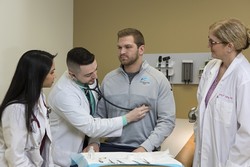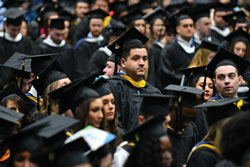During college, students are advised to participate in unique experiences by taking distinctive classes, joining new groups and taking part in religious experiences, but the question is posed: How religious of a campus is the University?
Dr. George Gonzalez, assistant professor of philosophy, religion, and interdisciplinary studies, said that the term “religion” has multiple definitions.
Gonzalez said, “At this time in a student’s life, [students] are given the tools to be critical of everything including one’s faith.”
According to Gonzalez, some of the effects religion has on a student are: reevaluation of a student’s view of the world, criticism of one’s religion, or help with strengthening faith.
Father William Lago, Catholic Chaplain, said that there are 4,700 undergraduate students and 2,630 identify themselves as Catholics. However, those numbers do not match up with attendance at Catholic Campus Ministry events.
Lago said that for Ash Wednesday mass, there were approximately 300 students, however, in contrast, for daily mass there are only three students that attend, only 12 that attend Thursday night socials that the Catholic Campus Ministry runs, and 10 for the Lent retreat this year.
Lago said that only 28 students attend Sunday mass regularly, which is less than one percent of the students who are described as Catholics.
Lago explained how the students that attend these events are devoted believers and important to the campus community.
“The students who attend are absolutely present to the prayer experience. They pay attention and take their faith seriously and also with great sense of humor/personality. They engage in their faith and make great comments and have great insights,” said Lago.
Lago said that according to statistics from Vice President Mary Ann Nagy, 56 percent of students identify themselves as Catholics but are not active with the Campus Ministry. In Lago’s former college, he said that religious groups used to plan their events very carefully because other groups would need the chapel as well. He also said, at the other college, there used to be a committee of all faiths to discuss that assisted with the scheduling of events. He does not see the same issue here.
Lago said, “MU does not have such a committee, nor do I know of any other religious groups using Withey Chapel. Therefore, it does not appear to be a religious community in these respects.”
Lago believes that religion should be important to college students because this is the time in a person’s life where their purpose and existence is questioned. This is referred to as the “adult appropriation of the faith,” according to Lago.
“Religion has the effect of grounding the college student in objective truth, helping them celebrate the gift of their life, religion has the effect of defining the identity of the college student, guiding their development as a self-less transcendent human person, helping them discern and make appropriate decisions, and religion can have the effect of helping a college student heal after serious life-events [that caused] harm/damage,” said Lago.
Eryn Siddall, junior psychology major, is a member of the Catholic Campus Ministry and feels that everyone is very welcoming when it comes to religion but also feels that a lot of students do not attend religious events out of fear of being judged.
“I think many students are afraid to open up about their faith because they don’t want to be judged by their friends or seem weird,” said Siddall.
Siddall continues, “I think if people were more accepting to religious practices on campus it would be a lot easier for people to get more involved. Not that I’m saying people don’t accept other’s religions, but I think it needs to be more acceptable for students to join religious clubs and to not feel uncomfortable in any way about doing so.”
Rilee Licht, junior creative writing major, is a Jewish student who feels the University is open to all religions but feels that religion is a topic that no one really talks about.
“MU seems like an understanding campus but for some reason the talk about any other religion isn’t around,” said Licht.
Reem Alsalman, junior biology major and Vice President of the Muslim Students Association, is proud of her beliefs and wears her head scarf every day, which in Islam is a symbol of modesty. She said that she is asked by multiple members of the University community about the head dress and other aspects of her religion.
“Students, professors and even employees have approached me about my religion, but not in a rude or aggressive way. Rather, they were curious and interested about why I wore it and what it symbolized; many even complemented the way it looked,” said Alsalman.
Kevin Holton, junior English major, does not associate with any religious group but believes in the five pillars of Buddhism, which he practices. He said that being Buddhist has not affected his life drastically but does keep him centered especially when he is stressed. One of the advantages, Holton said, is mediation which helps him control stress and anxiety.
Holton said that the University as a whole is not religious but he has met many students with different religious backgrounds.
Holton said, “I’ve met plenty of Atheists and Agnostics, just as I know a lot of members of other religions, though there is a strong Christian base.”
He continued, “Monmouth University is a very diverse and open environment that allows religion to express itself without the faculty or students really committing to one religion or another. We’re not a religious community so much as we are an accepting one.”
Mara Ciga, junior marine and environmental biology and policy major, is an active member of the Jewish community on campus. She believes one of the main reasons for lack of religious participation is that there is no one to force a student to attend religious services.
“I think a main reason that not so many people are so vocal about their religious affiliations are because when you are young at home, your parents are the ones who make you go to church or temple, and you kind of just go because you have to,” said Ciga.
Harmony Bailey, junior history major, is Protestant Christian but believes that the University is mainly composed of Catholics and Jewish students.
Bailey said, “I have not met anyone else who is Protestant, only Catholic or Jewish. I’m open and welcoming towards all faiths and walks of life. I just wish there was more people who are open about their faith.”
Bailey said she has no issue with how people talk or spread their personal beliefs but does believe people are hesitant to be open about it in college in general.
“Generally speaking I think most college students try to hide their religious tendencies in order to blend in or avoid confrontation with other religious groups,” said Bailey.



